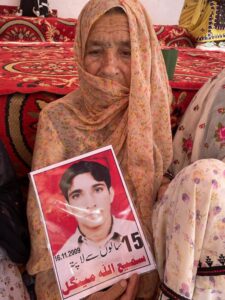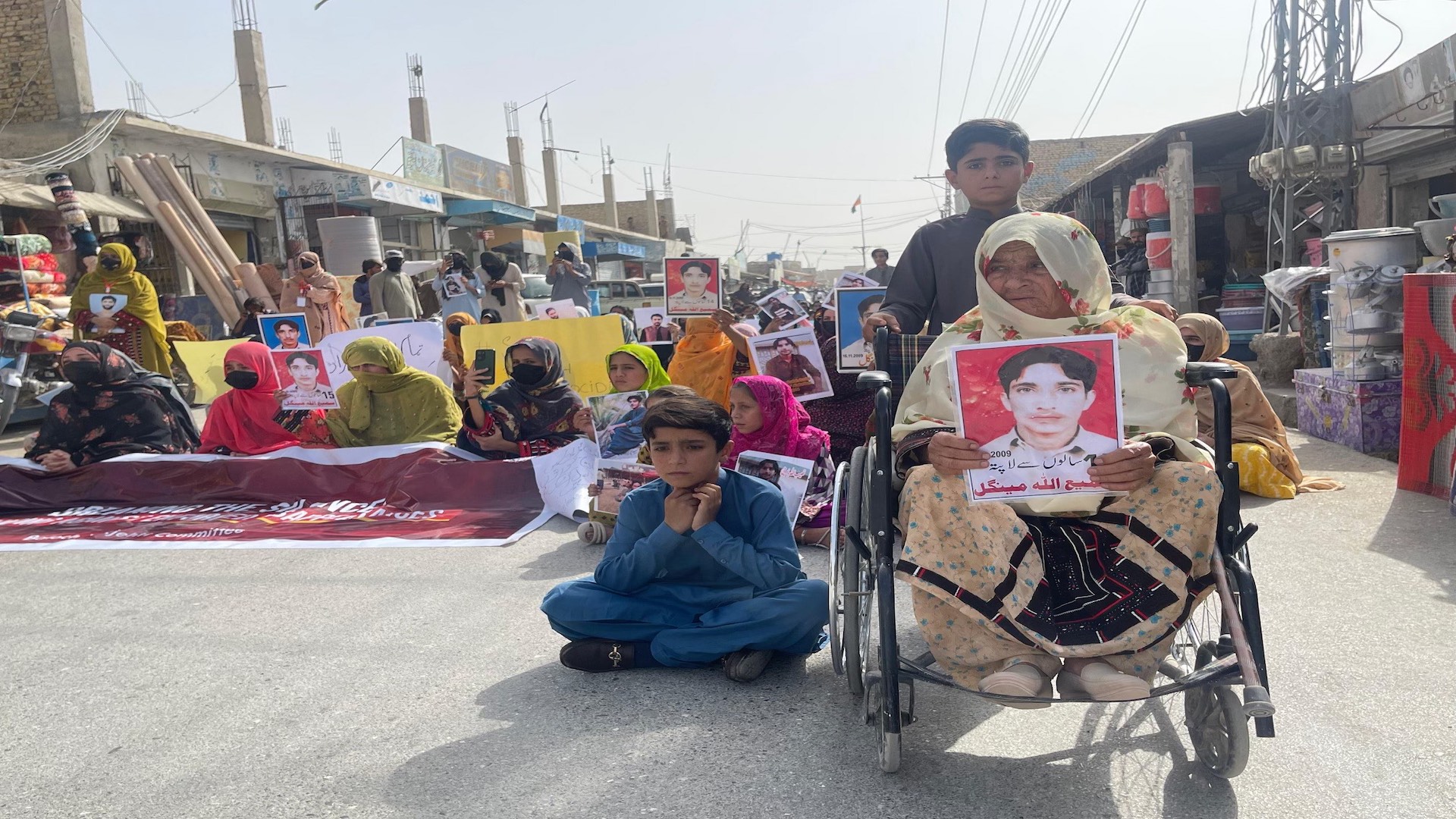A four-hour journey from Quetta, the capital of Pakistan’s restive Balochistan province, to the city of Nushki, takes you through a vast desert painted in shades of gold. The city shines under the sun, surrounded by mountains and open sand. In the heart of Nushki lives Bibi Hajira, a frail woman in her 80s. Her skin is withered, bearing scars from the toll of life and illness; diabetes has required four surgeries, each one leaving her weaker, her blood pressure an ever-present companion. Her face is weary, her hands delicate and trembling, yet they hold tightly to a single photograph.
When you arrive at her home, words aren’t necessary—her hollow gaze and the way she cradles the photograph of a young man reveal a world of grief and longing. She never lets it out of her sight, never places it on the floor. The picture she holds so dearly is of her missing son, Sami Ullah Mengal, for whom she fasted for months, even through Nushki’s intense summer heat. Nushki is one of the hottest regions in Balochistan, but she remained steadfast in her prayers. Over the years, she sacrificed more than 25 goats and a cow, selling the gold jewelry she had saved for Sami’s wedding—a Baloch tradition where the groom’s family gifts gold according to their means.
Her son, Sami, who was then 18-years-old, was forcibly disappeared 15 years ago from Quetta, Balochistan. Since that day, this woman has known no peace. She shared that she often dreams of him, but in all her dreams, he is still a child. “It’s been 15 years, and now he’s grown up. I wish I could see him as he is now, in my dreams,” she says, her voice trembling.
For the past 15 years, Bibi Hajira has kept her door open—day and night, through the coldest winters and the fiercest storms. Not once has she shut it, even during the harshest weather. “I keep my door open because, maybe someday, in the middle of the night, Sami will come back from the dungeons and he will think of me that his mother didn’t wait for him,” she says.
Her other children ask her not to leave the door open in winter, when the cold seeps into the house. But she remains firm. “I keep the door open because what if he returns late at night? I don’t want him to feel cold while waiting outside.”
Sami was a young boy, yet he volunteered as a tutor in Nushki. After his classes, he would come home for lunch and then return to teach the kids, spending his days this way.
“He was very sincere and sensitive, unlike my other children. He loved education,” his mother shared, her voice filled with pride. She recalled a moment when she told him, “Why are you wasting your time with these kids? Rest at home.”
His response still echoes in her heart: “They are our future, mother. Let them be educated.”
Sami Mengal was a Zoology student in his third semester at the University of Balochistan when he was abducted by the Frontier Corps (FC) in August 2009. It happened for the first time in Quetta’s Satellite Town, while he was on his way to teach a tuition class. He was accused of possessing a hand grenade and was kept in custody for 14 days. His case was brought before a session’s court in Quetta, and he was detained in the Central Jail for two months. A bail application was filed for him as his exams were scheduled for November. After appearing twice before the session court, he was released in November.
However, on November 16, 2009, after his court appearance, things took a darker turn. Sami’s elder brother, Abdul Rehman Mengal, was with him that day. They were at T. Dees tailor shop on Dr. Bano Road to collect Eid clothes. As the tailor was preparing to dispatch the garments, a black Vigo vehicle pulled up in front of the shop. “They were armed but in plain clothes. They covered our heads with clothes and took us to the Quetta cantonment. Our pictures were taken. Sami was then taken through another gate,” his brother recalled.
That was the last time Abdul Rehman would see his brother. An hour and a half later, they handcuffed Abdul Rehman, placed him in a car, and dropped him off on an empty road. They removed his handcuffs and threw him out of the car.
“It was desolate, and I could feel there were no humans around. I didn’t even know where I was. It was freezing cold,” he says. “The shawl I had been holding before the abduction was thrown over me, and they left.” He continued walking, struggling against the freezing cold of Quetta’s night. It wasn’t until later that he realized he was on Airport Road.
When they returned his mobile phone, he called his uncle. Around 4 p.m., they reached the Civil Lines Police Station in Quetta, but the police refused to file a report. The next day, Abdul Rehman held a press conference in Quetta and filed a Constitutional Petition in the High Court. Following the High Court’s orders, they were finally able to file an FIR.
Sami’s brother, Abdul Rehman, shared that in 2010, the Supreme Court formed the commission of inquiry for missing persons, with a mandate to investigate enforced disappearances and provide recommendations for eliminating this practice.
Justice Fazal-ur-Rehman registered Sami’s case with the commission, and the proceedings began. At the same time, the case was ongoing in the High Court. However, Justice Faizi of the High Court later dismissed the case because Abdul Rehman, who was a professor at Nushki Degree College, missed a court hearing.
“I couldn’t travel from Nushki to Quetta for one hearing, and they dismissed the case. But justice was never given,” he recalled.
After the High Court dismissed the case, Abdul Rehman submitted a petition to the Supreme Court. During this time, the commission’s chief justice changed, and Justice Mohammad Ghaus took over. “He then rejected my case, citing the High Court’s dismissal,” he shared.
A year and a half later, a Supreme Court bench came to Quetta for registry, and Abdul Rehman brought Sami’s case before them again. “They sent my case back to the Commission on Missing Persons and overturned the High Court’s dismissal.”
Abdul Rehman further recounted that he was an eyewitness to Sami’s enforced disappearance, along with two others: the tailor who saw Sami taken and a third man, from Sindh, who was detained in the same torture cell as Sami. Upon his release, this man came to their mother and shared what he had seen. He even recorded a video testimony, which Abdul Rehman later submitted to the Joint Investigation Team (JIT).
During this time, Justice Fazal-ur-Rehman once again became head of the commission. Court proceedings continued, and the evidence was accepted, leading to the issuance of a production order for Sami. Still, there was no progress.
“I wrote another application to the commission,” Abdul Rehman said. “Five months later, I was summoned, only to be told to return after two months.” On his second visit, he was informed that the commission was awaiting explanations from the agencies. Another four to five months passed, yet the commission never summoned him again.
In 2012, a UN team on missing persons visited Pakistan and at Quetta at Serena Hotel to document cases of missing persons, and Abdul Rehman registered Sami’s case there as well. “To this day, we have no trace of him,” he said, his voice tinged with frustration.
“After following all the legal channels, Sami was never released. I still wonder how the court dismissed my case over missing a single hearing, while the judiciary itself failed to deliver justice in 15 years—even with all the evidence I provided,” he laments.
Rehman no longer believes in the judiciary or the law and has stopped going to court. “Sami was the youngest of us. My siblings and I have all grown up, and now we have children of our own. Deep down, I know Sami is no longer alive. The way the man from Sindh described his torture—no one could survive that. And even if he had, how could a young man endure such suffering for 15 years?”
Sami’s mother still held onto hope that when Sami was released, she would cook a feast for the entire town of Nushki, so everyone could celebrate his return.
At the Baloch Yakjehti Committee’s gathering in Nushki on August 12, families of the forcibly disappeared sat together, united in their grief. Among them was Hajira Bibi, enduring the extreme heat. Every ten minutes or so, she would lose consciousness, then wake, splash water on her head, and sit back up—only to faint again.

“I am weak now; it’s hard for me to even move,” she admitted. “But I wanted to be here, to show my presence for my beloved Sami, even if it means feeling this weakness and fainting over and over.”
Sami’s father died in 2017 waiting for his son. “Before he passed, he told me his final wish, which has since become my mission, even as I feel like I am nearing my own final days,” she shared. “He said, ‘If Sami is ever released, bring him to my grave and make him stand in a way that I can see him.’ I feel the weight of those words, feeling I failed as a wife because I couldn’t fulfill his wish and bring Sami to his father’s grave.’”
Although her movements are limited, she still attends protests, even in a wheelchair. “My children worry about me and try to stop me, but they’ve learned to let me go,” she said. “They think I’m being stubborn, but how can anyone understand the madness that grips a mother when her young, handsome son disappears?”
The author is a Balochistan-based feature writer covering war and enforced disappearances in the province.

